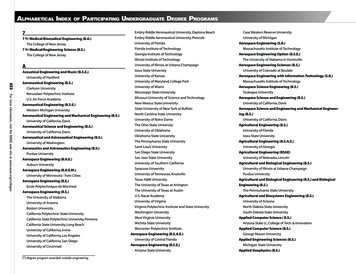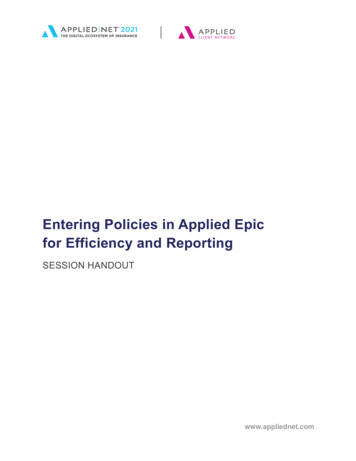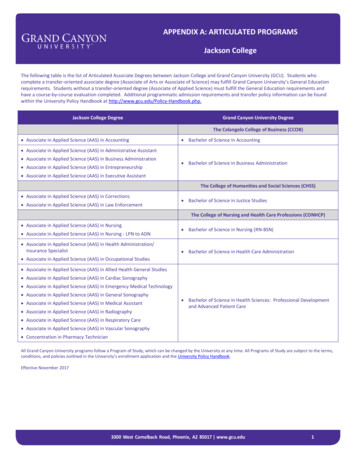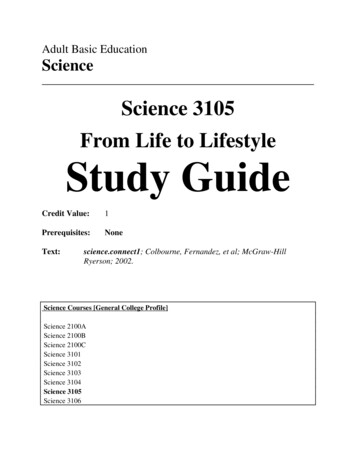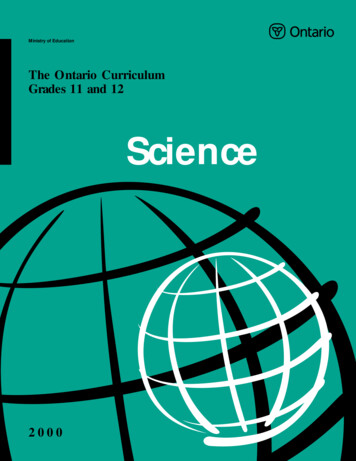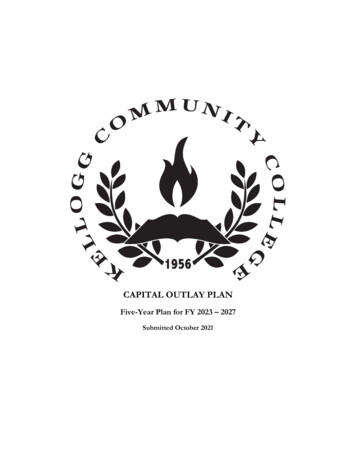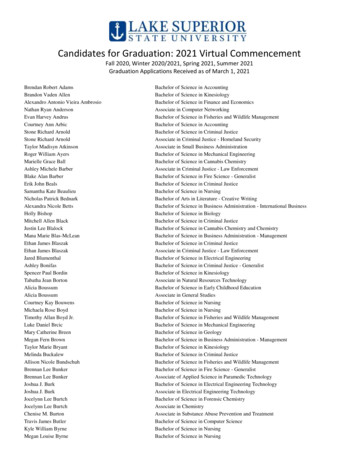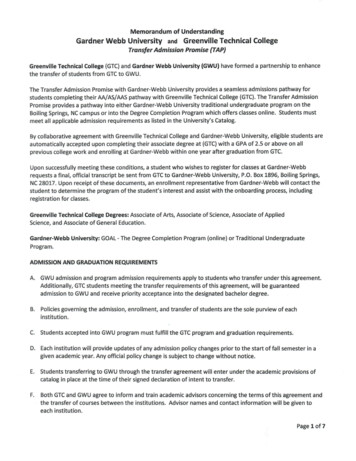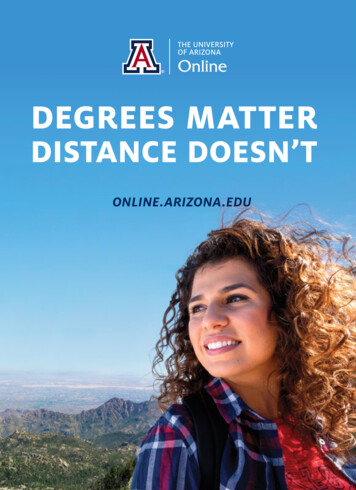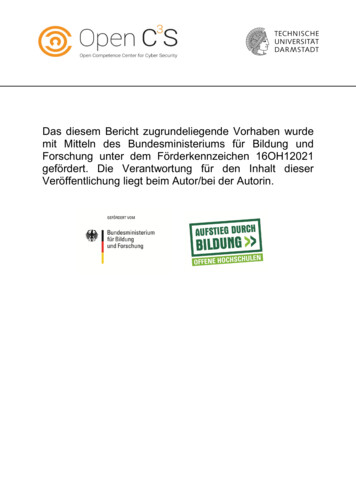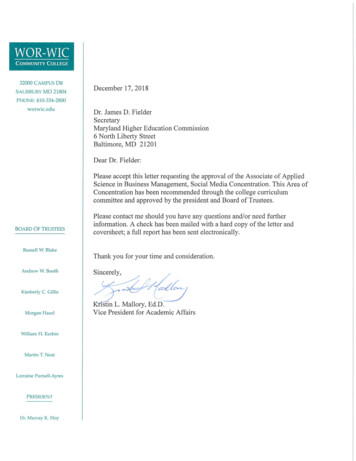
Transcription
Associate of Applied Science in Business Management: Social Media Specialist AOCWor-Wic Community CollegeA. Centrality to Institutional Mission Statement and Planning Priorities1. Description of program:The proposed AAS in Social Media Specialist as an area of concentration withinBusiness Management is the outgrowth of input from the Business Program AdvisoryCommittee (PAC). Students will take specific course work related to social mediamarketing, appropriate technologies to support a social media effort and digital mediabased communication.The proposed program relates to the college’s mission of enhancing “ local economicgrowth by addressing the educational, training and workforce development requirementsof the residents of Worcester, Wicomico and Somerset counties” and by “ providingaffordable, high quality instruction for postsecondary credit programs and continuingeducation in a technology-driven environment.” The Social Media Specialistconcentration will allow students an affordable, high quality education to prepare forcareers in a growing occupational area.2. Support of strategic goals:The proposed area of concentration directly supports the following strategic priorities forthe college:1.Increase student success by delivering relevant courses and programs, providingflexible scheduling and diverse delivery methods, and improving developmentaleducation student outcomes. The goals are to:a. Strengthen the alignment of programs and courses with local employer needs.The Business PAC has been informing the Business Department for several yearsthat there is a growing need for social media managing skills in entry level positionsin our service area. This feedback evolved into a request that Wor-Wic CommunityCollege address their concerns with specific course content that would permit localemployers to hire support staff that could develop and monitor an online presencefor small businesses. This proposed AOC has been developed to address theidentified needs of local employers.2. Address community needs by developing and implementing a college wide plan thatfocuses on student recruitment, retention, academic advising and other supportstrategies. The goals are to:a. Increase recruitment of new students.Some of the students for this AOC will be drawn from current BusinessManagement AAS students. The degree also offers a credential in a relevant skill setthat will draw new students to the school that had not considered an occupationaldegree.b. Improve student retention and completion rates1
It is believed that by offering a degree that is relevant to what employers are seeking,students will be motivated to complete the degree as a necessary step to futureemployment.3. First 5 years funding:Initial support for the proposed program will be provided by the utilization ofcurrent resources including faculty, library and support resources and equipment.Additional funding for any needed part-time faculty will be provided out ofinstitutional operating funds.4. Institutional Commitment:Wor-Wic Community College is committed to the development and full implementation ofthe proposed program. The objectives of the program support the college mission and goals.Wor-Wic outlines eight specific college goals. The proposed program aligns with Collegegoals 1, 2, 3, 4 and 7 as identified on the college website:College goal 1: “Provide service area residents with access to quality education andtraining at training at a reasonable cost.” Currently, no local area colleges offer anassociate level degree in social media (within a 60 mile radius). The proposed area ofconcentration will provide local area residents with access to a social media specialistoption.College goal 2: “Offer courses and programs to prepare students for entry into theworkforce, career advancement, licensure, certification, transfer to four-year colleges anduniversities, and personal development.” The Social Media Specialist developmentconcentration will prepare students to enter into career opportunities supporting the socialmedia needs of local businesses and other organizations.College goal 3: “Promote economic development by providing innovative programs andservices that address the needs of business, government, nonprofits and other communitygroups.” The Business Program Advisory Committee has been asking for and providinginput into programming to address the social media needs of local businesses for the past 3years. The development of this concentration allows future business students and employeesto respond more fully to the demands and needs of specifically requested skills andknowledge by employersCollege goal 4: “Provide students with educational experiences and support services thathelp them achieve their goals through college completion and workforce preparation.” Theproposed program is designed to promote student goal achievement through advancedknowledge and training, providing content specifically requested by workforce demand.College goal 7: “Acquire appropriate human, financial and technological resources to meetinstitutional needs.” Through the institutional budgetary process, the college is dedicated toproviding sufficient financial resources necessary to support the Social Media SpecialistArea of Concentration.2
B. Critical and Compelling Regional or Statewide Need as Identified in theState PlanGoal 5 of the Maryland Plan states that “Technological advances and globalizationhave fostered significant changes in the workplace. Employers have invested heavily innew upgrades and equipment and expect that employees will possess the skills requiredto work in these enhanced environments.” Also, “Academic programs with activeadvisory boards are recognized by business and industry as more responsive to workforceneeds and as producing more employable graduates.” And that “in order to equip theworkforce with required skills, the line of communication between education andbusiness must remain open. Input from industry-specific experts is essential for thedevelopment of strategies that support a knowledge-based economy.”As noted previously, this degree area of concentration proposal is a direct reflection ofthe input of industry specific input from the PAC. As service area employers moverapidly towards a more knowledge and technology based communication approach theyfind the required skill set is in short supply.C. Quantifiable and Reliable Evidence and Documentation of Market Supplyand Demand in the Region and State1. Potential employment opportunities and level of entryGraduates will be able to assume entry level positions in marketing or institutionalcommunications. They would report to a marketing manager, director of communicationsor a social media manager. In a small business, graduates could be the sole social mediaexpert along with other job responsibilities. Opportunities can be found in businesses,non-profits and governmental organizations in the service area.2. Data analysis projecting market demandAccording to emarketer.com -mediaad-spending-worldwide-will-rise-7-4-in-2018) digital media spending for 2018 isprojected to account for 43.5% of all marketing media spending. By 2022, 53.9% ofmarketing media spending will be with digital media. In the past 5 years, social mediaspending has increased from 1.5 billion to 7.6 billion. And, according tomarketingcharts.com s-82242), justin 2017 advertising spending on Facebook and Instagram grew 40.5% and Snapchatshowed 51% growth. In fact, in an April 2018 article, The Guardian reported that “moremoney will be spent advertising on social media networks than on the entire TV admarket within two years, according to a new e-of-facebook-woes3
3. Educational and training needs over the next 5 yearsSince social media communications is an emerging mode of communication for manybusinesses, specific data on positions requiring social media skills is either not identifiedin existing data sets or occupational descriptions are vague. For example, The DLLROccupational Projections for the Lower Shore does not list any occupational headingsthat refer to social media occupations at all.According to EMSI Q3 2018 data set for the seven local counties surrounding thecollege, there will be job growth through 2025 of 17.2% (1324 new jobs) in threeoccupational areas Advertising, Marketing, Promotions, Public Relations, and SalesManagers, Media and Communication Workers and Business Operations Specialists thatmay use social media communication technologies. EMSI does not identify social mediaspecialist as a specific occupational category either.However, projected job growth is positive, if modest, for the service area and the socialmedia field is growing exponentially. The conclusion is that a significant portion of thejobs created will include jobs requiring social media skills.4. Current and Projected supply of prospective graduatesCurrently, there are no entry level social media specialist or marketing programs in thelocal area. As social media continues to grow, employers will not be able to findapplicants with specific expertise in this area. After implementation of the newconcentration, it is projected that there will be approximately 15-20 graduates per yearready to support local businesses – particularly small businesses.Social media marketing is a high growth area and service area businesses are not able totake advantage of all it offers due to a lack of expertise in the workforce.D. Reasonableness of Program Duplication1. Similar programs in state or surrounding area:There are no comparable programs in the college coverage area, the larger regional areaof the Delmarva Peninsula or at Maryland Community Colleges.2. Justification for Proposed ProgramA concentration in Social Media Specialist will allow graduates to support the socialmedia marketing and internal communication efforts of businesses, non-profits andgovernmental organizations in the service area.E. Relevance to High Demand Programs at Historically Black InstitutionsThe Social Media Specialist concentration is an occupational degree focused around thebusiness core and creating a specific set of job skills. It is not proposed as an entry pointto further education at any four year school in Maryland. However, all historically blackinstitutions in Maryland, Bowie State University, Coppin State University, Morgan State4
University, and University of Maryland Eastern Shore offer business degrees. As such,the proposed degree may be used in part to allow limited transfer to these programs.F. Relevance to the Identity of Historically Black InstitutionsWor-Wic Community College serves a diverse student population seeking careeradvancement and training in business and marketing professions. The business programsare professionally defined disciplines lending themselves to degree programs offered atfour-year universities. All historically black institutions in Maryland offer programs inbusiness and as such would be candidates for further study beyond the proposed program.As appropriate, articulation agreements could be developed between Wor-WicCommunity College allowing graduates to transfer limited credits into Bachelor degreeprograms.G. Adequacy of Curriculum Design and Delivery to Related LearningOutcomes1. How program was established and faculty who will oversee the program.The degree was established through a multidisciplinary effort of the Arts and HumanitiesDepartment, the Technology Department and the Business Department. Each area isproviding courses specific to this area of concentration.2. Educational objectives and learning outcomesGraduates of the Social Media Specialist concentration will be able to:1. Demonstrate appropriate digital media communication skills;2. Implement, monitor and assess a social media communication effort;3. Demonstrate social media communication skills and knowledge in a workplacesetting according to the standards of the respective agency.Student Learning Outcomes:1. Students will be able to professionally communicate through digital media.2. Students will be able to manage digital content.3. Students will be able to create a basic social media presence for a small business orsupport a sophisticated effort in a corporate setting.4. Students will be able to collect and analyze data from social media platforms.3. Explain how the institution will provide for and document assessment of studentachievement of learning outcomesStudent assessment and documentation of learning outcomes will be done in the samemanner as other occupational programs at Wor-Wic Community College. Each course will5
have a comprehensive final exam or project that provides specific course objective resultsthat are linked to learning outcomes. Also, all students are placed in an agency setting andfeedback data related to learning outcomes is collected from each agency for each student.4. Course list including title, credit hours, and course descriptions:CourseCreditsGeneral Education RequirementsEnglishENG 101Fundamentals of English IMathematicsMTH 152Elementary StatisticsArts and HumanitiesENG 151Fundamentals of English IICOM 102Introduction to Human CommunicationSocial Behavioral ScienceECO 201Principles of MicroeconomicsBiological / Physical ScienceOne course from a variety of disciplines333333-4Business Core RequirementSDV 100BMT 260ACT 101BMT 101BMT 102BMT 125BMT 220OFT 155OFT 160Fundamental of College StudyBusiness Management Field ExperienceFinancial AccountingIntroduction to BusinessMarketingFinanceProfessional PracticesWord ProcessingSpreadsheets123333333Social Media Area of Concentration CoursesBMT 130BMT 235COM 120CMP 130CMP 246SOC 101TotalSocial Media MarketingSocial Media Planning SeminarWriting for Digital MediaIntroduction to Web DevelopmentDigital Content ManagementIntroduction to Sociology333333606
Course Descriptions:ENG 101 – Fundamentals of English I – 3 credits (English composition requirement)This course is designed to help students develop their college-level writing skills with anemphasis on the writing process. This course includes an introduction to research skills.Students write summary assignments and a series of essays in various modes,culminating in an argumentative research paper. Students must earn a grade of “C” orbetter in this course in order to enroll in ENG 151. Hours: 39 lecture. Prerequisites: ENG095 and ENG 096, or ENG 097, with grades of “C” or better, or acceptable reading andwriting placement test scores. Usually offered in the fall, spring and summer.MTH 152 – Elementary Statistics – 3 credits (Mathematics requirement)This course introduces elementary statistics through a critical examination of its subjectsand applications. Topics from descriptive statistics include data organization, expectationand measures of variation. Also covered are random variables, probability laws, countingtechniques, binomial and normal distributions, applications of the central limit theorem,confidence intervals and test of statistical hypotheses involving the mean, median andproportions. Topics from parametric and nonparametric statistics are introduced. Hours:39 lecture. Prerequisite: ENG 095 or ENG 097 and MTH 092 with grades of “C” orbetter or acceptable reading mathematics placement test scores. Usually offered in thefall, spring and summer.ENG 151 – Fundamentals of English II - 3 credits (English requirement and arts andhumanities requirement)This course continues to help students develop their college-level writing skills. Studentsare introduced to the study of literature (prose, poetry, fiction and drama). Studentsintegrate outside sources with their own ideas in written arguments. They also refine theirresearch and documentation skills. Hours: 39 lecture. Prerequisite: ENG 101 with agrade of “C” or better. Usually offered in the fall, spring and summer.COM 102 – Introduction to Human Communication – 3 creditsThis course is designed to provide an introduction to the field of communication.Interpersonal communication, nonverbal communication, group dynamics, interculturalcommunication, gender communication and public speaking contexts will be covered.Students will apply relevant theories and explore research within each context to developa solid foundation in the discipline. Hours: 39 lecture. Usually offered in the fall andspring.ECO 201– Microeconomics – 3 credits (Social/behavioral science requirement)This course provides an overview of basic economic concepts and institutions, the natureof economic activity and an analysis of the function of the economic system. Studentsapply an economic perspective to questions that firms and households must answerbefore making decisions. Students also study the interdependency of global economies.7
Hours: 39 lecture. Prerequisites: ENG 095 and ENG 096, or ENG 097, with grades of“C” or better, or acceptable reading and writing placement test scores. Usually offeredin the fall, spring and summer.Biological/Physical Science Requirement 3-4 CreditsChoose From: BIO 101 – Fundamentals of Biology, CHM 101 – General Chemistry I,ENV 101 – Environmental Science, GEO 101 – Earth and Space Science, or PHY 104 –Physical ScienceSDV-100 – Fundamentals of College Study 1 – creditThis course is designed to introduce students to the information and habits that facilitateacademic success at the college level. The course presents modules focusing on theexpectations and realities of college responsibility; active learning and critical thinkingskills; increasing motivation and decreasing stress; analyzing the syllabus, instructor andcourse; establishing a learning style; organizing and balancing family, work and school;improving study and note-taking skills, and test-taking strategies; advisement,registration and the college catalog; safety, student services and other administrativeresources; rules, regulations and civility; and lifelong learning. Students who do not passthis course must take it again the following fall or spring term. Hours: 15 lecture. Usuallyoffered in the fall, spring and summer.BMT-260 – Business Management Field ExperienceIn order to obtain an actual training experience, the student secures or is placed in anapproved position relevant to his or her area of emphasis. The student is required todevelop, in cooperation with the instructor and field supervisor, a learning contract forthe field experience. Supervision and grading of the training experience are provided byboth the instructor and the field supervisor. Hours: 100 as an intern. Prerequisites:Permission of the department head. Usually offered in the fall and spring.ACT 101 – Financial Accounting – 3 creditsThis course offers a comprehensive study of basic accounting principles and procedures.Students recorded accounting transactions, prepare financial statements, apply internalcontrols, account for assets and liabilities, and utilize ration analysis. Hours: 39 lecture.Prerequisite: ENG 095 or ENG 097 and MTH 091 with a grade of “C” or better, oracceptable reading and mathematics placement test scores or permission of thedepartment head. Usually offered in the fall and spring.BMT 101 – Introduction to Business – 3 CreditsThis course covers the role and function of the business enterprise within the UnitedStates economic framework. Students explore the internal and external environments thatimpact business organizations and the various forms of business ownership. Studentsstudy the responsibilities of functional groups that work together to achieve businesssuccess and evaluate real life business situations. Hours: 39 lecture. Prerequisite: ENG8
095 or ENG 097 with a grade of “C” or better, an acceptable reading placement testscore or permission of the department head. Usually offered in the fall and spring.BMT 102 – Marketing – 3 CreditsThis introductory marketing course covers the various activities that are required forbusinesses to successfully develop their products and services, bring them to theconsumer, encourage sales and secure earnings. Students will develop the knowledge toanalyze marketing situations and recommend an appropriate marketing strategy. Hours:39 lecture. Usually offered in the fall and spring.BMT 125 – Finance – 3 creditsThis course is designed to provide essential financial tools and knowledge to start oroperate small business enterprises. Material covered includes; financial and economicconcepts, financial planning and management, the preparation and analysis of financialstatements, forecasting, working capital management, capital budgeting, and principles ofpersonal finance. Hours: 39 lecture. Usually offered in the fall and spring.BMT 130 – Social Media Marketing – 3 CreditsThis course explores various activities related to social media marketing including targetmarket identification, identifying appropriate marketing strategies, analyzingperformance metrics, and using tools to manage and monitor social media activity.Hours: 39 lecture. Prerequisite: BMT 102 with a grade of “C” or better or permissionof the department head. Usually offered in the spring.BMT 220 – Professional Practices – 3 creditsThis course is designed to develop the student’s ability to integrate the technical andhuman relations skills necessary to succeed in today’s business environment. The focusis on project management, maintaining a professional online presence, business ethics,professional communication as well as effective team interactions, and advancedpresentation skills. Hours: 39 lecture. Prerequisite: OFT 155 with a grade of “C” orbetter or permission of the department head. Usually offered in the spring.BMT 235 – Social Media Planning Seminar – 3 CreditsStudents, working in teams, will participate in a semester long case study designed toprovide practical experience in auditing an online marketing effort and developingrecommendations based on key findings. Students demonstrate proficiency in variousareas of social media marketing planning including conducting a marketing SWOTanalysis, creating a social media marketing plan, and creating a budget and ROI analysis.Hours: 39 lecture. Prerequisite: BMT 130 with a grade of “C” or better or permissionof the department head. Usually offered in the fall9
COM 120 – Writing for Digital Media – 3 creditsIn this course, students will develop digital literacy and learn to write for digital mediaenvironments, considering audience and context. Students will produce multiple on-lineprojects with a focus on form and style. Students will be introduced to writing for socialmedia as well as theory of storytelling and scriptwriting for media such as games,multimedia web series, podcast, and commercials. Hours: 39 lecture. Prerequisite ENG101 with a “C” or better. Usually offered in the fall and spring.OFT 155 – Word Processing – 3 creditsThis course covers fundamental through advanced word processing skills includingcreating, editing, and formatting documents, creating tables, working with themes, styles,graphics, and templates, merging and integrating data with various programs and theWorld Wide Web. Hours: 39 lecture. Laboratory fee: 15. Usually offered in the fall andspring.OFT 160 – Spreadsheets – 3 creditsThis course covers spreadsheet development, including creating, editing, formattingworksheets and charts, creating and working with formulas, collaborating and securingdata and integrating worksheet data with various programs and the World Wide Web.Hours: 39 lecture. Prerequisite:MTH 092 or an acceptable mathematics placement testscore or permission of the department head. Usually offered in the fall and spring.CMP 130 – Introduction to Web Development – 3 creditsThis course covers the principles of creating hypertext markup language (HTML) forwebpages and the elements used to create them. Cascading style sheets (CCS) areintroduced to add style to webpages and to create enhanced visual effects. Responsiveformatting techniques are introduced to make the site adaptable. This course covers thefundamental elements needed to create webpages. Students design and build a websiteusing current technology. Hours: 26 lecture and 26 laboratory. Laboratory fee: 25.Usually offered in the fall.CMP 246 – Digital Content Management – 3 creditsThis course provides an opportunity for students to examine social networks, socialmedia and online advertising techniques for improving web presence. Students alsoexplore technical and creative elements to create organic search engine optimization(SEO) to improve ranking, drive traffic and increase awareness in search engines.Students identify web-based marketing opportunities and recommend an appropriateweb-based management strategy. Hours: 39 lecture. Prerequisite CMP 130 orpermission of the department head. Usually offered in the spring.10
SOC 101 – Sociology – 3 creditsThis course stresses the study of man in his social relationships. Topics include thepatterns of culture, population, social institutions (familial, educational, religious,economic and political) and social change. . Hours: 39 lecture. Usually offered in the falland spring.6. General Education requirements:For an associate of applied science (AAS) degree, 18 hours of general education creditsare required. The program will meet these requirements through the general educationcourses listed above.7. Contracting with other organizations, copy of contract:Does not apply8. Assurance of information for students:If approved, the area of concentration degree pattern will appear in the school’s onlinecatalog as presented above. All course descriptions showing credit hours, prerequisitesand when the courses will be offered will appear in the catalog as well. The degree willbe added to all the current degree options at Wor-Wic Community College, have thesame academic support services available to all students and the same institutionalpolicies will apply. All courses taught at Wor-Wic Community College utilize a learningmanagement system and appropriate orientation to the system is provided for all students.9. Assurance of advertising, recruiting and admissions material will accurately representthe proposed program:All program materials will be vetted by the Department Head and the Dean ofOccupational Education to insure accuracy of content. Information about the programwill be presented to all faculty advisors and other staff that act in a student advisingcapacity. The program will be presented to secondary school students that tour thecampus (along with other programs) and also presented to high school CTE principals,faculty and counselors as part of an annual articulation meeting.H. Adequacy of ArticulationDoes not applyI. Adequacy of faculty ResourcesThe faculty to support this program will come from three different departments. The Artsand Humanities department will provide the communications courses, the Technologydepartment will provide the computer/technology courses and the Business departmentwill provide the word processing, marketing social media related courses. Current fulltime faculty staffing levels are considered sufficient to support the requested addition of11
the new concentration. It is anticipated that part-time faculty teaching up to 12 credits peryear will be required to permit current full time faculty to teach the Business andCommunication courses.FacultyMemberTerminal DegreeMichael Kelley B.S. – Computer ScienceFull / ParttimeFull-timeCourses TaughtCMP 130, Introductionto Web DevelopmentCMP 246, DigitalContent ManagementDana BurnsideMA – CommunicationStudiesFull-timeD.A. – EducationCOM 102, Introductionto HumanCommunicationCOM 120, Writing forDigital MediaLucindaStanleyBS – BusinessAdministrationFull-timeBMT 102, MarketingMS – Business EducationBMT 130, Social MediaMarketingMS – Instructional Design& TechnologyBMT 235 Social MediaPlanning SeminarPhD – InstructionalDesign and OnlineLearningJ. Adequacy of Library ResourcesStudents in the Social Media Specialist concentration will have ready access to a supplyof current and relevant books, journals, periodicals, computers, software, and otherreference materials needed to meet the requirements of the curriculum. The programbudget allocates funding for specific reference materials. Wor-Wic uses an electroniclibrary that supports the academic needs of constituents. Multiple Media Centers arestaffed to provide research assistance. Web-delivered subscription databases coveracademic disciplines, including technology and marketing disciplines. Wor-Wic studentsalso have privileges for the libraries at University of Maryland Eastern Shore andSalisbury University.12
K. Adequacy of Physical Resources, Infrastructure and InstructionalEquipment1. Assurance of information for students:All the courses that are part of this proposal will be taught in existing facilities. Thefacilities feature state of the art classrooms and computer lab and are more than adequateto support the objectives of the program.2. Assurance of adequate distance education resources:a. All students are assigned a Wor-Wic email account specifically for non –coursecommunication and are assigned an email account in each scheduled course through thelearning management system for course related communication.b. The learning management system is supported through faculty training, studentorientation, a help desk for students experiencing technical difficulties and on campuscomputers for student use if desired. An instructional technologist supports faculty withlearning management systems advice, training and direct assistance.L. Adequacy of Financial Resources.Table 1. provides details of the resources generated and provided by the new program. Theforecast is predicated on the initial enrollment of 10 students (combined full time/part tim
The proposed AAS in Social Media Specialist as an area of concentration within Business Management is the outgrowth of input from the Business Program Advisory Committee (PAC). Students will take specific course work related to social media marketing, appropriate technologies to support a social media effort and digital media based communication.
